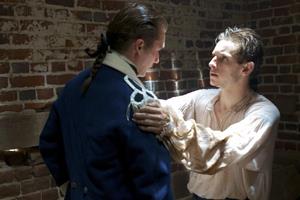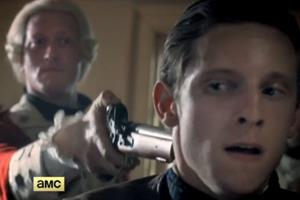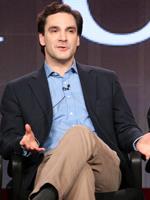[Editor's Note: TVWW contributor Donna J. Plesh died April 2, 2015, from ovarian cancer. She was 71. Donna covered television since the early 1980s, initially for the Orange County Register and its TV magazine. She also was a member of the Television Critics Association. Donna was always a cheerful spirit within the TVWW network and often gave readers a kind, up-close viewpoint in her interviews with a wide variety of television stars. She will be missed.]
There are spies among us. There always have been spies and likely always will be, be they meeting informants in darkened parking garages, secret buildings, following our every Internet move, or perhaps even being that nice couple living next door.
AMC’s new 10-episode drama series Turn, premiering at 9 p.m. ET Sunday, goes back in time to the Revolutionary War, to the formation of this country’s first spy ring. Those first spies were farmers, trappers and smugglers living in New York, on Long Island and in Connecticut, and they formed the Culper Ring that would help Gen. George Washington turn the tide of the war against the British, in favor of the rebels.
 Turn is loosely based on Alexander Rose’s book Washington’s Spies, The Story of America’s First Spy Ring. It stars Jamie Bell as farmer Abraham Woodhull, and Seth Numrich as Benjamin Tallmadge. Along with other childhood friends, they formed the Culper Ring. Their spying was dangerous, with British soldiers living near them, in some cases with them, and closely among them and their families.
Turn is loosely based on Alexander Rose’s book Washington’s Spies, The Story of America’s First Spy Ring. It stars Jamie Bell as farmer Abraham Woodhull, and Seth Numrich as Benjamin Tallmadge. Along with other childhood friends, they formed the Culper Ring. Their spying was dangerous, with British soldiers living near them, in some cases with them, and closely among them and their families.
For the British-born Bell, Turn is his first foray into American television, and he is playing an early American hero. In a recent TCA interview session, Bell said what he learned growing up in England about the Revolutionary War in this country was little.
“They taught us that we lost. It isn’t really taught in schools. I don’t think it’s something that still, to this day, we look on particularly fondly because it wasn’t part of the curriculum. We did [learn] a lot of the British monarchy and then kind of skipped that [Revolutionary War] part. I knew very little about British rule in the Colonies and what that was like for the Colonists living there,” he said.
The actor feels the focus of Turn is “that these colonists were kind of fighting a big brother. It wasn’t like one force against another. They were all kind of the same thing. And it really was more of a sibling rivalry, trying to gain their independence from their bigger brother, in a way. So they all kind of feel part of the same thing.
"You know no one’s obviously speaking with American accents. America, as an idea, wasn’t really even established yet. So it was more in the sense of separation happening. And I think that this show kind of delves into that really well, in the sense that it’s not so much the invaders and the occupied, you really get a sense that these people are all from the same place, and they’re really fighting for that sense of separation.”
Co-star Numrich, an American, feels somewhat the same as Bell about how the war was, or was not, taught in schools in this country.
 “In a way it’s not really [taught] here. It’s not really the complication of what actually went on at that time, and the fact that most Americans or Colonists were against the idea of separating from Britain,” he said.
“In a way it’s not really [taught] here. It’s not really the complication of what actually went on at that time, and the fact that most Americans or Colonists were against the idea of separating from Britain,” he said.
Executive producer Barry Josephson [Bones, The Finder] concurs, saying that what most of us are taught in grade school about the Revolutionary War is very “black and white, David and Goliath. We learn that and then we move on. And the truth is that the truth is much more complicated. There’s a seamy underbelly to the war. It wasn’t just an invasion for us against, you know, [a band of] scrappy guerrillas. It was neighbor versus neighbor, and families split right down the middle,” he said.
Show runner and executive producer Craig Silverstein (Nikita, Terra Nova) feels Turn is the first real modern spy story.
“I mean, the birth of modern trade craft was worked out here through trial and error. Aliases, cover stories, dead drops, the idea of a black budget, a lot of cryptography. These things were invented by the Culper Ring, but out of necessity, not because they came in as experts and knew what they were doing. So what surprised me when I read Alex’s book was to find out that it wasn’t achronistic, it was the start of it all,” he said.
 Author Rose (right), a consultant on the series, said in his research for the book, “the most surprising thing I uncovered, actually, was just how much or how greatly George Washington delighted in spying the daylights out of the enemy.
Author Rose (right), a consultant on the series, said in his research for the book, “the most surprising thing I uncovered, actually, was just how much or how greatly George Washington delighted in spying the daylights out of the enemy.
"We always tend to think of Washington, for instance, as this solemnly sort of figure on a $1 bill, you know, who’s completely and utterly humorless. But, in fact, you know, he did take — what I discovered was that he took this very deep interest in the goings-on of this very obscure bunch of people on Long Island. This is the commander-in-chief of the Continental Army, of course. You know, he was kind of... this great father figure to them.
"So it was this unseen or hidden side of Washington that really sort of took me aback, that it’s been completely sort of obscured over the last 200 years or so in order to maintain some kind of Presidential dignity and authority to him. But, you know, he was a real, live breathing person, and he just loved to spy."
Rose added, "He was really good at it.”